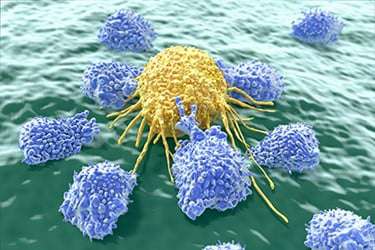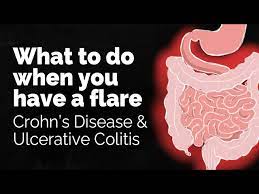Inflammation is the cause of many diseases and conditions. About 3 to 5 people die worldwide from chronic inflammatory diseases. Whether that disease is stroke, chronic respiratory diseases, heart disorders, cancer, obesity, or diabetes inflammation is one of the main factors behind that condition.
Chronic inflammation is incredibly difficult to treat. The medical community has only created a handful of effective therapies that are able to reduce inflammation levels in patients with chronic inflammation. This problem is not going away anytime soon. Chronic inflammation diseases are on the rise as well.
The medical community needs to develop more effective treatment options for patients with all levels of inflammation. Researchers are looking for alternative treatment options in order to lower levels of chronic inflammation. Increasing your natural killer cell count may be beneficial to improving your body’s response to inflammation.
Natural killer cell therapies may be the future of treating inflammation. Before we jump into how natural killer cells may be able to help treat inflammation, let’s get a better understanding of inflammation.
What Is Inflammation?
Inflammation is the body’s natural response to protect itself from harm. That harm could be anything from bacteria entering your body or a splinter that breaks a patient’s skin. Inflammation can be caused by a number of factors. The source of the inflammation may not be completely obvious to patients or their doctors.
What Happens In The Body When It Is Inflamed?
A number of different immune system pieces and cells are involved when the body has an inflammatory response. The immune system releases inflammatory mediators, such as histamines. These inflammatory mediators can open up the small blood vessels that lead directly to various tissues. The extra blood that flows into the damaged tissue can improve the ability of the body to heal the damaged cells and tissues.
Additionally, more immune cells can be carried to the injured area to fight off against any potential pathogens that are entering the exposed area of the body. The increased hormone levels from the inflammation will cause the nerves in the damaged area to be more sensitive. This is because the body wants you to protect that damaged area, which is why a patient will feel pain in the area.
The body also swells in the affected area, due to the extra fluid present in the area. The swelling and heightened level of pain in the area generally subsides once the body is able to heal and protect the damaged area. Another example of inflammation is when a patient has a stuffy nose. Your body is attempting to flush the virus out of your system by creating more fluid in the nose. Once the body is rid of the virus, the inflammation level typically decreases in the target area.
When the inflammation level does not go down after a period of time, it can cause a number of health issues for patients.
Why Is Inflammation Bad?
Inflammation Can Be Good
Inflammation is great when the body is attempting to fight off a potential infection or heal damaged tissue. When inflammation is acting as it should, it is known as acute inflammation. This type of inflammation only lasts about two to six weeks. Once the inflammation subsides, the body will return to normal function, until the immune system needs to react to an event again.
Long-Term Inflammation
If inflammation does not subside in the affected area after a period of time, the condition is known as chronic inflammation. Generally, chronic inflammation is defined as inflammation that lasts longer than six weeks. Chronic inflammation can lead to a number of complications, including death.
Long-term inflammation is characterized by corrosive extracellular matrix, deficiency of regulatory growth factors, hypoxia, and cellular senescence. In more layman terms, it means that inflammation causes there to be more damage to tissue, less healing capabilities at the site of inflammation, and less oxygen at the site of inflammation. All of these factors lead to the development of several conditions and diseases.
Sudden, severe inflammation can also lead to a number of complications. Emergency room patients often deal with sudden and severe inflammation after their first injuries are dealt with. The immune system most likely attempts to create a huge inflammatory reaction in order to attempt to keep the body alive. Sadly, this may actually create the opposite effect.
Now that we have a better understanding of inflammation and the role it plays in the body, let’s jump into natural killer cells. It may be helpful to understand how natural killer cells contribute to inflammation and what therapies can be used to decrease the level of inflammation.
What Role Do Natural Killer Cells Play In Inflammation
Emerging research is showing evidence that natural killer cells may have the ability to contribute to immunological memory. Immunological memory is the ability of the immune system to recognize a foreign invader in the body. When the immune system identifies an antigen that it has previously encountered, it can create a response to fight off the antigen. Part of this response is the creation of inflammation.
In the past, researchers believed that only T-cells and B-cells were involved in this part of the immune system. There are different types of memory natural killer cells where they vary in terms of their tissue localization patterns. Researchers have found three types of natural killer cell memories: Hapten Specific, Virus Specific, and Cytokine Induced.
Hapten-Specific Natural Killer Cell Memory
Haptens are small molecules that create an immune response when they attach to a protein or pharmaceutical drug. One group of memory natural killer cells are generated when the hapten is used to generate an immune response. This should help the body to respond to a threat to the body when detected by the immune system. This type of natural killer cells are only found in the liver.
Virus-Specific Natural Killer Cell Memory
This type of natural killer cell is created when the body fights off a specific virus. The immune system will generate memory natural killer cells that can react when they detect the virus. Virus-specific memory natural killer cells can be located in different areas of the body. Researchers believe that the type of infection or virus plays a part in where these cells reside. For example, influenza memory natural killer cells are located in the liver and lungs.
Cytokine-Induced Natural Killer Cell Memory
Cytokine-induced memory natural killer cells can be generated through the presence of certain inflammatory cytokines. A virus or antigen does not need to be present in order for this type to be generated. This type of natural killer cell is found throughout the body and is not located in one specific place. Cytokine-induced memory natural killer cells can elicit an immune response when they detect a cytokine.
Researchers are hopeful that a better understanding of memory natural killer cells will lead to the development of better vaccines and treatments for infectious diseases. Natural killer cells could be used to elicit the correct immune response in patients who have never encountered a certain virus. Understanding these memory natural killer cells can give researchers a better understanding of inflammation and what the medical community can do to fight inflammation.
Natural Killer Cells & Autoimmune Diseases
Natural killer cells have the ability to destroy infected and malignant cells. A unique feature of natural killer cells is that they do not have to wait for the immune system in order to take action. Natural killer cells utilize molecules that are cytotoxic and apoptosis-inducing proteins in order to kill the cell.
Natural killer cells also have the ability to create cytokines and chemokines that can help the body fight off a potential infection. This is generally a good reaction, but it can go awry when the natural killer cells release these defense mechanisms when there is no active threat. Natural killer cells and cytokines may end up attacking healthy tissue and cells in the body. This can potentially lead to the development of chronic inflammation.
Natural killer cells may be key players in the development of several autoinflammatory diseases. These disorders are generally associated with cytokine storms or disorders where there are a number of highly activated immune cells. Natural killer cells may be causing the long-term activation of the immune system and causing more harm than good in some cases.
Some researchers believe that natural killer cells that are malfunctioning are the reason why chronic inflammation and autoimmune disorders occur in patients. This may be the case in some diseases, such as Active Adult-onset Still Disease. The chronic inflammation causes a number of symptoms in patients that have autoimmune disorders.
Researchers are actively looking for ways to treat chronic inflammation. The development of natural killer cell therapies may be a way to reduce inflammation.
Some Promising Research
Researchers looked at myocarditis, which is the inflammation of the heart muscle, and the role that natural killer cells played in the condition. Their lab previously showed that natural killer cells helped to prevent continued heart inflammation by fighting the virus that is causing the inflammation. Further natural killer cell research showed that this was not the only role that natural killer cells played in the development of the condition.
A group of mice with myocarditis were given a dose of natural killer cells to understand how they interacted with the condition. The researchers were able to show that natural killer cells have the ability to control the level of inflammation at the inflamed site. Natural killer cells were able to reduce the levels of chemokine expression in the heart tissue, which led to a lower level of inflammation.
A number of other interesting studies have investigated whether or not natural killer cells can be used to combat various inflammatory conditions and diseases. Researchers at the University of Georgia’s Regenerative Bioscience Center found that natural killer cells may be able to prevent the progression of Parkinson’s disease. Natural killer cells may have the ability to reduce the level of inflammation in brain tissue, as well as reduce the creation of protein clumps in the brain.
Additionally, researchers found that mice with a depleted level of natural killer cells had worse symptoms than mice with higher levels of natural killers cells. Natural killer cells and their ability to reduce inflammation levels and clear protein clumps is important to reduce the level of Parkinson’s disease in a patient. It is clear that natural killer cells are a huge part of chronic inflammation and how patients develop autoimmune diseases and inflammatory conditions.
A better understanding of natural killer cells can lead to the development of various therapies. Stem cell therapy could be beneficial to the development of natural killer cell therapies.
Stem Cells & Natural Killer Cells
Stem cells have long interested researchers for developing potential therapies for a variety of conditions and diseases. The abilities of stem cells make them attractive for a number of reasons. Stem cells have the ability to differentiate into almost any cell in the body, including natural killer cells. If a patient receives stem cells into the target area of inflammation, they could turn into natural killer cells.
Additionally, it has been noted through various studies that stem cells have anti-inflammatory effects. Some researchers have theorized that stem cells are able to reduce the immune system’s response. It could be that the stem cells are creating new natural killer cells that are reducing the inflammation level in the patient.
A patient that receives a stem cell IV therapeutic treatment may be able to increase the number of healthy, functioning natural killer cells. Increasing the number of natural killer cells that work correctly may be able to improve the symptoms of some patients that experience chronic inflammation.
If you have chronic inflammation, increasing your natural killer cell level may help to reduce the amount of inflammation present in your body. Researchers are continuing to develop innovative therapies that can treat a number of chronic conditions. Natural killer cell therapies may be able to one day cure autoimmune diseases.


